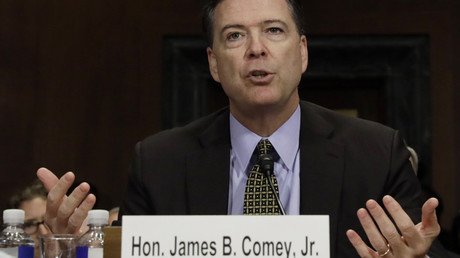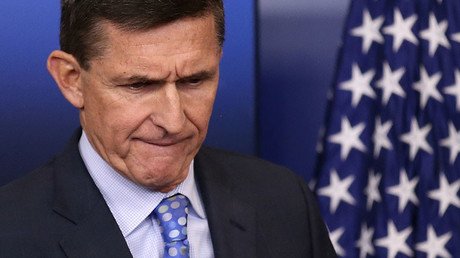'No evidence Russia influencing voter tallies in...50 states' ‒ US ex-intel chief
While testifying before a Senate Judiciary subcommittee on alleged Russian interference in the 2016 campaign, ex-National Intelligence Director James Clapper said he doesn't have any evidence that Moscow influenced voter tallies on Election Day.
The Senate Judiciary Committee is investigating alleged Russian meddling in the 2016 US presidential election. Clapper appeared with former Acting Attorney General Sally Yates. The highly anticipated hearing was expected to fill in key details in the chain of events that led to the ouster of General Michael Flynn, President Donald Trump's first national security adviser, during the administration’s first month in office.
"Can we agree that the Russians attempted to influence the outcome of the election?” asked Senator John Neely Kennedy (R-Louisiana) during the Subcommittee on Crime and Terrorism hearing on Monday.
"Yes," Clapper and Yates replied.
"Did they succeed?" asked Kennedy.
“We could not make that call,” replied Clapper.
"The only thing we said was we saw no evidence of influencing voter tallies in any of the 50 states, but we were not in a position to judge whether ‒ what actual outcome on the election," added Clapper.
Kennedy then asked "Have you ever leaked?"
“Not wittingly or knowingly,” replied Clapper.
"Classified or unclassified?," said Kennedy.
“Unclassified is not leaking," remarked Clapper as laughter erupted in the room.
When it came to the January 6 report that accused Russia of “influence campaign” during the US presidential election, some “two dozen or so” handpicked analysts from three agencies – the CIA, the FBI and the NSA – compiled the information, Clapper told the subcommittee, headed by Senators Lindsey Graham (R-South Carolina) and Sheldon Whitehouse (D-Rhode Island). All 17 intelligence agencies were consulted in some form ahead of the report’s release, and Clapper said he was “not aware of anyone who dissented or disagreed.”
“The most important thing is to educate the electorate as to what the Russian objective is,” Clapper said. “There needs to be more done in the way of sanctions to the Russians or any other government that attempts to interfere with our election process.”
"#Russia congratulating themselves, exceeded wildest expectations" - Former ODNI #Clapper on #Russiagate
— RT America (@RT_America) May 8, 2017
LIVE: https://t.co/Fq68KIe1Kxpic.twitter.com/Dx3VFMRjGG
"Russia’s influence activities in the run-up to the 2016 presidential election constituted the high-water mark of their long-running efforts since the 1960’s to disrupt and influence our elections," said Clapper. "They must be congratulating themselves for having exceeded their wildest expectations. They are now emboldened to continue such activities in the future, both here and around the world, and to do so even more intensely."
Moscow likely spent some $200 million, not including government support for RT, enabling them to interfere “with minimal resource expenditure,” Clapper told Sen. Amy Klobuchar (D-Minnesota).
“RT is essentially a propaganda mouthpiece for the government,” Clapper added. “The management is close to Putin.”
Clapper also told Sen. Ben Sasse (R-Nebraska) that “In comparison with classical military expenditures, it’s a bargain for them.”
All the ways RT ‘influenced’ American politics ‒ it’s not what the ODNI thinks https://t.co/xFuUQianZMpic.twitter.com/2lLdxUmBaV
— RT America (@RT_America) January 9, 2017
Sen. Dianne Feinstein (D-California) called alleged Russian involvement “a foregone conclusion.”
Clapper incorrectly claimed that no Republican data was released during the campaign, WikiLeaks co-founder Julian Assange said on Twitter, offering documents published in August 2016 as proof.
DNI Clapper just misled or perjured himself to Congress saying that there was no release of Republican data. Proof: https://t.co/A2u3YFHShM
— Julian Assange (@JulianAssange) May 8, 2017
Clapper echoed remarks by CIA Director Mike Pompeo that WikiLeaks is propaganda platform for Russia and that it’s a non-state intelligence actor.
Yates reminded the committee of her 27-year career at the Department of Justice and praised their “impartial and thorough investigation” of the Russian threat.
“The efforts by a foreign adversary to interfere with and undermine our democratic processes ‒ and those of our allies ‒ pose a serious threat to all Americans,” she said.
Yates told the panel that she warned the White House about Flynn multiple times, including “two in-person meetings and one phone call” with White House counsel Don McGahn about Flynn’s activities. At that point, on January 26, she had “notes that described” the FBI’s interview with Flynn from the day before, and didn’t want to wait to get a readout of the interview.
Yates and another DOJ official went to the White House because they were “worried American people may have been misled about Gen. Flynn’s underlying conduct,” and that the Russians knew “and likely had proof” which created a compromising situation because Vice President Mike Pence “was unknowingly making false statements to the public” and thus “Flynn was compromised with regards to the Russians.”
“We felt the vice president was entitled to know” that the information he was giving the public was not true, Yates said, but would not reveal what Flynn’s “underlying conduct” because that was “based on classified information.”
Yates said that, during her meeting with McGahn, he “certainly demonstrated that he understood this was serious.”
“If nothing was done, then certainly it would be concerning,” she added.
White House spokesman Sean Spicer confirmed media reports that former President Barack Obama had spoken against Flynn in a transition meeting with Trump.
“This is a guy who was very outspoken in his criticism of President Obama’s policies,” Spicer said of Flynn during the White House press briefing on Monday, going on to question why the Obama administration allowed Flynn to travel to Russia and did not revoke his security clearance.
“If they were concerned, why didn’t they take any steps?” asked Spicer.
If #Obama was concerned about #Flynn's security clearance, 'then what did they do and, if nothing, then why not?' - #Spicerpic.twitter.com/qBmY5J43zq
— RT America (@RT_America) May 8, 2017
During the hearing, Clapper addressed such questions in the hypothetical, noting that he didn’t have any specifics of how the Trump transition team vetted Flynn, but saying that the vetting process for the White House is supposed to be “far, far more invasive and far, far more thorough.”
There were nearly 2,000 requests to unmask the identity of surveillance targets in 2016, Clapper noted, adding that he had never requested unmasking for personal, political or voyeuristic purposes, nor was he “aware of any instance of such abuse by anyone else.”
There were many questions Yates couldn’t answer in an open hearing because her responses contained classified information, including Graham’s query of whether there was any evidence that anyone in the Trump campaign colluded with Russia.
#Clapper & #SallyYates deny having shared or enabled information sharing with media on #Trump and associates https://t.co/Fq68KIe1Kxpic.twitter.com/kCOFYK3nHi
— RT America (@RT_America) May 8, 2017
Neither Clapper nor Yates knew how information from Flynn’s conversation with Russian Ambassador Sergey Kislyak ended up in the Washington Post, and both denied leaking any stories about Trump and his associates to the press, whether directly or through someone else.
READ MORE: Pentagon inspector general opens investigation into former Trump adviser Flynn
Yates was the acting attorney general at the time of Trump’s first travel ban, and was fired after refusing to enforce it. On Monday, Trump urged the committee to question her under oath about classified information she was privy to ended up in the media, implying that the former Obama appointee may have been behind the leaks.
Ask Sally Yates, under oath, if she knows how classified information got into the newspapers soon after she explained it to W.H. Counsel.
— President Trump (@POTUS) May 8, 2017
Several senators asked Yates about her memo to the Justice Department, in which she argued that Trump’s first travel ban was unconstitutional.
“I believed that any argument that we would have to make in its defense would not be grounded in the truth,” she told Sen. John Neely Kennedy (R-Louisiana), adding that the intent behind the executive order didn’t convince her that it was constitutional.
“Who appointed you to the US Supreme Court?” he retorted.
US ex-intel chief Clapper believes Russia-Trump claims, despite ‘no evidence to his knowledge’ https://t.co/fOum9uC2Xz
— RT America (@RT_America) March 6, 2017
Sen. Patrick Leahy (D-Vermont) pointed out that, during her confirmation hearing, then-Senator Jeff Sessions (R-Alabama) pressed Yates to say that she would defy an illegal order from the president.
The Senate committee hearing occurred at the same time as government lawyers were arguing that the administration’s second ban should be allowed to proceed.
LIVE: Yates & Clapper testify on alleged Russian interference in US 2016 election
Posted by RT America on Monday, May 8, 2017














